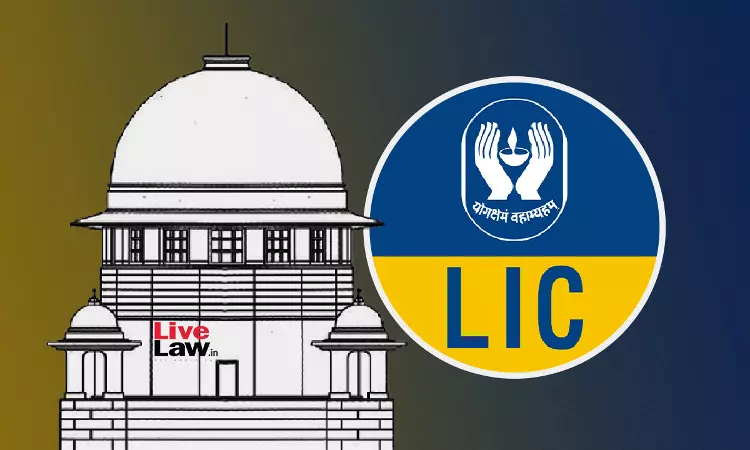- Home
- /
- Supreme court
- /
- Suppression Of Drinking Habit...
Suppression Of Drinking Habit Justifies Rejection Of Health Insurance Claim For Alcohol-Related Hospitalisation: Supreme Court
LIVELAW NEWS NETWORK
25 March 2025 6:34 AM
The Supreme Court recently ruled that insurers can reject health claims related to alcoholism if the policyholder concealed alcohol drinking habit while buying the policy.The Supreme Court approved the decision of the Life Insurance Corporation (LIC) to repudiate a claim over the hospitalisation of a policyholder under the "Jeevan Arogya” scheme since he gave false information regarding...
The Supreme Court recently ruled that insurers can reject health claims related to alcoholism if the policyholder concealed alcohol drinking habit while buying the policy.
The Supreme Court approved the decision of the Life Insurance Corporation (LIC) to repudiate a claim over the hospitalisation of a policyholder under the "Jeevan Arogya” scheme since he gave false information regarding his habit of alcohol consumption.
A bench comprising Justice Vikram Nath and Justice Sandeep Mehta was deciding an appeal filed by the LIC against the order of the National Consumer Disputes Redressal Commission (NCDRC) which upheld the decisions of the State and District fora to pay ₹5,21,650 and costs to the claimant.
In this case, the claimant's husband, Mahipal, took LIC's "Jeevan Arogya" policy in 2013. The policy provided hospital cash benefits, entitling the insured to daily cash payments of ₹1,000 for non-ICU hospitalization and ₹2,000 for ICU hospitalization. Almost a year after taking the policy, the policyholder was admitted to the hospital due to severe abdominal pain. After a month's hospitalisation, he died.
The claim made by the widow of the policyholder was rejected by the LIC on the ground that the deceased had concealed material information regarding his chronic alcoholism. The LIC cited the the exclusion clause of the Jeevan Arogya Plan, specifically Clause 7(xi), which excludes coverage for:"Self- afflicted injuries or conditions (attempted suicide) and/or the use or misuse of any drugs or alcohol and complications arising from it."
The claimant then approached the Consumer Forum, which directed the LIC to reimburse the medical expenses.
The Supreme Court disapproved of the approach taken by the NCDRC and the Consumer Fora. At the outset, the Court noted that the Consumer Fora misconstrued the policy as a medical reimbursement policy. Even if the claim was upheld, the claimant was entitled only to the specified cash benefits.
Next, the Court examined the medical records, which clearly stated that the patient had a history of "chronic alcohol intake." In the proposal form of the policy, there was a specific question - "Does the Life Insured consume Alcohol/Cigarettes/Bidis or tobacco in any form?". The answer given to this question by the policyholder was "No."
The SCDRC rejected the hospital note regarding chronic alcohol intake on the ground that it was issued a year after the policy was taken. The Supreme Court disagreed with this approach, saying that chronic liver disease, caused by prolonged alcohol consumption, does not develop overnight.
"The deceased's alcoholism was a long- standing condition, which he knowingly suppressed while subscribing to the policy. Given this suppression of material facts, the appellant was justified in repudiating the claim under the exclusion clause," the Court observed.
The NCDRC had relied on the Supreme Court's judgment in Sulbha Prakash Motegaoneker & Ors. v. Life Insurance Corporation(2015), which held that mere suppression of a pre-existing disease was not a ground to reject a claim. However, the Court distinguished Sulbha Prakash Motegaoneker on facts, noting that in that case, the suppressed disease was not the cause of the death. Though the cause of death was cardiac arrest in the instant case, it was related to his chronic liver disease, which was developed due to alcoholism.
"The record shows that he was hospitalized for severe abdominal pain and vomiting—complications commonly associated with chronic liver disease. He remained hospitalized for nearly a month before succumbing to a cardiac arrest. Given this medical history, it cannot be said that the cardiac arrest was an isolated event, unrelated to the pre-existing chronic liver disease."
The Court also noted that Sulbha Prakash Motegaoneker was subsequently explained in a later decision, Bajaj Allianz Life Insurance Co. Ltd. v. Balbir Kaur, by stating that when the pre-existing disease was the cause of death, its suppression would justify the repudiation of the claim.
"Thus, Sulbha Prakash Motegaoneker does not establish a general principle of law applicable to all cases of non- disclosure. Instead, each case must be assessed based on its specific facts," the Court said.
"The deceased's chronic alcoholism and liver disease were material facts that were deliberately suppressed when the policy was obtained. Given the clear exclusion clause, the appellant was justified in repudiating the claim."
Although the Court upheld the LIC's rejection, it noted that an amount of Rs 3 lakhs was already paid by it to the claimant as per the Consumer Commission's directions. Given the financial condition of the respondent, the Court refrained from allowing LIC to recover the amount from the claimant.
Case : Life Insurance Corporation vs Sunita and others | SLP(c) 15354/2020
Citation : 2025 LiveLaw (SC) 346
Click here to read the judgment

